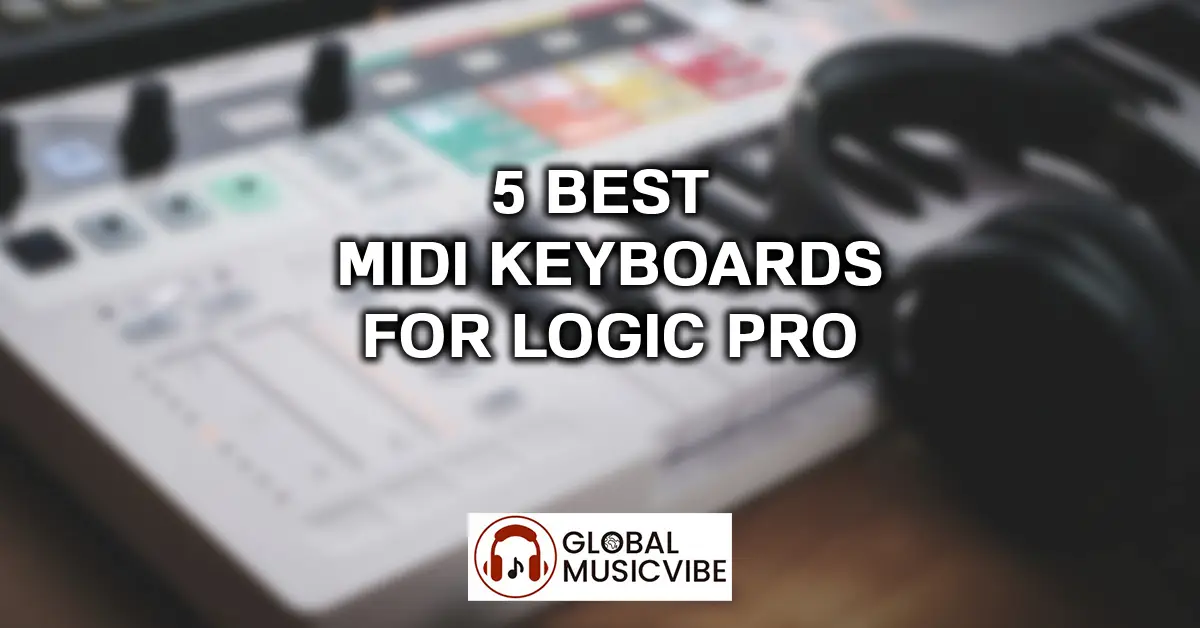When searching for the best MIDI keyboards for Logic Pro in 2026, I’ve spent considerable time testing various controllers to find options that truly enhance the production workflow. After I reviewed dozens of MIDI controllers over the years, I’ve learned that the right keyboard can transform your Logic Pro experience from frustrating to fluid. The MIDI keyboard market has evolved dramatically, with manufacturers now designing controllers specifically with DAW integration in mind.
| Model | Key Features | Pros | Cons |
|---|---|---|---|
| Arturia KeyLab Essential 61 | 61 synth-action keys, 9 faders, 9 knobs, full Logic Pro integration, solid metal build | – Excellent Logic Pro mapping- Affordable for its features- Good software bundle- Solid build quality | – Light synth-action keys- No aftertouch- Plastic pitch/mod wheels |
| Native Instruments Komplete Kontrol S61 MK3 | 61 semi-weighted Fatar keys, dual OLED screens, Light Guide, Smart Play, metal chassis | – Premium keybed w/ aftertouch- Smart Light Guide for scales/chords- High-res OLED displays- Excellent Logic Pro & NI plugin integration | – Expensive- Large desk footprint- Some features NI-specific |
| M-Audio Hammer 88 Pro | 88 fully weighted, graded hammer keys, metal build, transport controls, 3 pedal inputs | – Authentic piano feel- Durable construction- Full 88-key range- Great value for weighted action | – Very heavy- Few control knobs/pads- No display- Plain design |
| Novation Launchkey 49 MK4 | 49 synth-action keys, 16 RGB pads, faders, knobs, DAW/scale/arpeggiator modes | – Excellent pads- Strong Logic Pro integration- Built-in arpeggiator & scale mode- Compact design | – Synth-action keys- Plastic build- Some features favor Ableton |
| Akai Professional MPK Mini Plus | 25 mini keys, 8 pads, 4 knobs, joystick, OLED display, built-in speaker | – Ultra-portable- Built-in speaker- USB-C powered- Improved build over MK3 | – 25-key limit- Joystick takes adjustment- Small pads- Limited for mixing |
Arturia KeyLab Essential 61
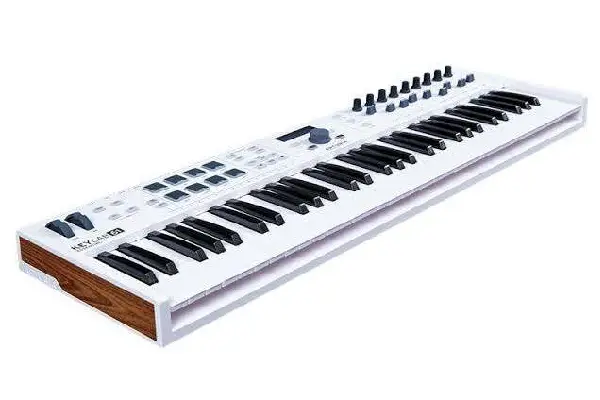
The Arturia KeyLab Essential 61 has become one of my go-to recommendations for Logic Pro users seeking a full-featured controller without breaking the bank. The 61-key configuration provides enough range for playing realistic piano parts and complex chord voicings, while the velocity-sensitive keys deliver surprisingly expressive performance despite being synth-action rather than weighted.
The integration with Logic Pro is where this keyboard truly shine The dedicated DAW/User switch lets you toggle between controlling Logic Pro’s parameters and your own custom mappings, which I found invaluable when switching between mixing and sound design workflows.
Pros:
- Excellent Logic Pro integration with pre-mapped controls
- Solid build quality with metal chassis
- Comprehensive control surface with faders and knobs
- Affordable price for the feature set
- Includes quality software bundle
Cons:
- Synth-action keys may feel light for pianists
- No aftertouch sensitivity
- Pitch and mod wheels are plastic and feel slightly cheap
Native Instruments Komplete Kontrol S61 MK3
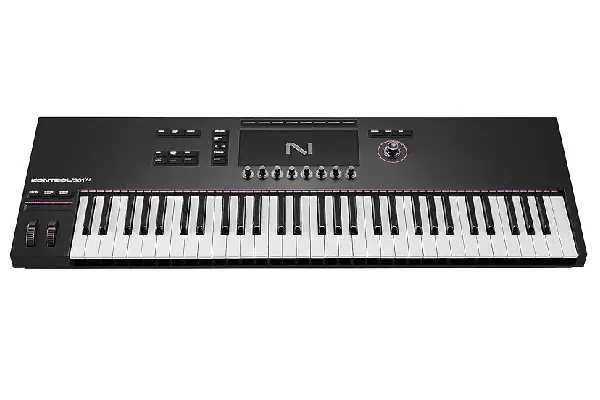
When I used the Native Instruments Komplete Kontrol S61 MK3 for several months in various production scenarios, it became clear why this keyboard commands a premium price. The third-generation model represents a significant evolution, and after I reviewed the improvements over the MK2, the enhanced key action stood out immediately. The Fatar keybed delivers semi-weighted action that strikes an excellent balance between piano-style playing and synth performance, responding beautifully to both delicate passages and aggressive playing.
The Light Guide feature, while initially seeming like a gimmick, proved genuinely useful when I checked its functionality with scale and chord modes. The color-coded LEDs above each key provide visual feedback for scales, help identify the correct keys for different musical modes, and even highlight which keys are active in complex layered patches.
- Premium Fatar keybed with polyphonic aftertouch
- Intelligent Light Guide for scales and chords
- Dual high-resolution OLED screens
- Seamless Logic Pro Smart Controls integration
- Excellent build quality with metal construction
Cons:
- Significantly higher price point
- Requires dedicated desk space
- Some features work better with Native Instruments plugins
M-Audio Hammer 88 Pro
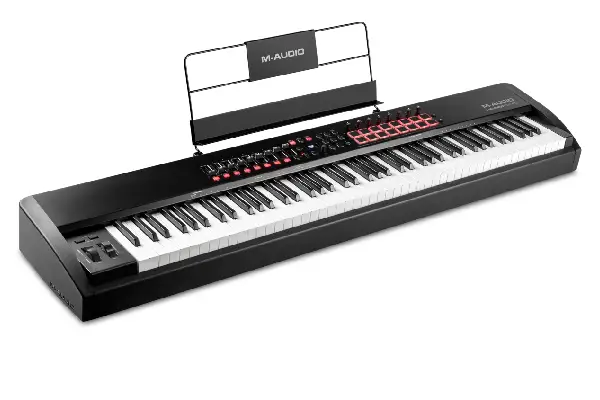
For those who need full-weighted piano action in their Logic Pro setup, the M-Audio Hammer 88 Pro delivers authentic piano feel at a fraction of the cost of premium alternatives. After I reviewed this controller specifically for piano-focused production, I found the fully-weighted, graded hammer-action keys remarkably close to acoustic piano response.
The build quality impressed me considering the price point after I checked the construction thoroughly, the metal chassis and solid keybed inspired confidence that this instrument could withstand years of heavy use. From my experience with Logic Pro’s transport controls, the dedicated buttons for play, stop, record, and loop functions eliminated the need to reach for my mouse during recording sessions.
Pros:
- Authentic fully-weighted, graded hammer action
- Full 88-key range for complete piano repertoire
- Solid metal construction for durability
- Three pedal inputs for complete expression
- Excellent value for weighted-key controllers
Cons:
- Heavy and requires substantial desk space
- Limited control surface features beyond keys
- No display screen for parameter feedback
- Basic aesthetic design
Novation Launchkey 49 MK4
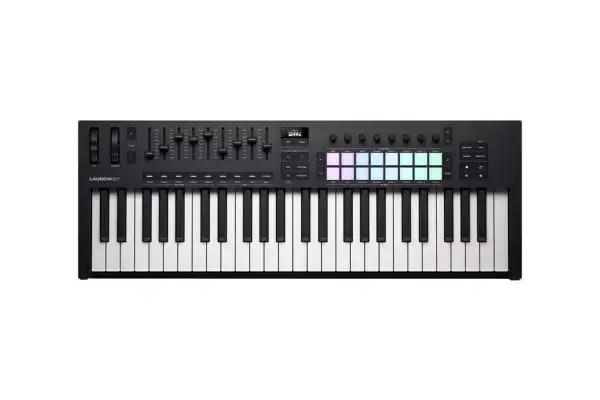
The Novation Launchkey 49 MK4 represents the latest evolution of one of the most popular MIDI controller series, and after I reviewed the fourth generation against its predecessors, the improvements are substantial. When I used this keyboard for electronic music production in Logic Pro, the combination of velocity-sensitive pads, knobs, and faders created an integrated control surface that kept my hands on the hardware instead of hunting for mouse controls.
The integration with Logic Pro has been thoughtfully implemented, with Novation providing DAW integration mode that maps controls intelligently to Logic’s functions. From my experience with the arpeggiator and scale modes, these performance features add creative possibilities that extend beyond basic MIDI input.
Pros:
- Excellent velocity-sensitive pads for drums and samples
- Thoughtful Logic Pro integration with DAW mode
- Built-in arpeggiator and scale modes
- Clear LCD display for parameter feedback
- Compact 49-key size balances range and portability
Cons:
- Keys are synth-action, not suitable for piano playing
- Some features better suited to Ableton Live
- Plastic construction feels less premium
- Pitch and mod wheels could be more robust
Akai Professional MPK Mini Plus
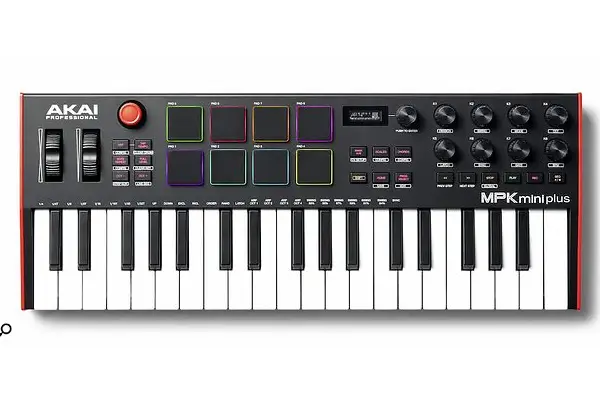
After I reviewed compact MIDI keyboards for mobile producers and those working in tight spaces, the Akai Professional MPK Mini Plus emerged as the best ultra-portable option for Logic Pro users. The 25 mini keys might seem limiting, but in my testing, they provided enough range for most melodic ideas, chord progressions, and bass lines.
What sets the Mini Plus apart from previous versions is the built-in speaker, which might seem like a novelty but proved genuinely useful when I used it for creating beats away from my studio monitors. The 8 backlit velocity-sensitive pads felt responsive and worked excellently for programming drums directly in Logic Pro’s Drum Machine Designer.
Pros:
- Extremely portable and fits in a backpack
- Built-in speaker for mobile production
- USB-C bus-powered operation
- OLED display for clear feedback
- Significantly improved build quality over previous versions
Cons:
- 25 mini keys limit range and playability
- Joystick takes time to adjust to versus traditional wheels
- Smaller pads than full-size controllers
- Limited control surface for mixing
Choosing Your Perfect Logic Pro MIDI Keyboard
Selecting the right MIDI keyboard for Logic Pro depends heavily on your specific production needs, available space, and budget. For producers seeking the best overall balance of features, build quality, and Logic Pro integration, the Native Instruments Komplete Kontrol S61 MK3 stands as the premium choice, though its higher price point may put it out of reach for beginners. The Arturia KeyLab Essential 61 offers remarkable value for those wanting comprehensive DAW control without the premium price tag.
The MIDI keyboard market continues to evolve with manufacturers increasingly focusing on DAW integration rather than just providing basic MIDI input. From my experience reviewing music production gear across various categories, including options found in our instruments section, the trend toward intelligent, context-aware controllers benefits producers immensely.
The investment in a quality MIDI keyboard pays dividends in improved workflow, better performances, and ultimately, better music. When comparing different options, consider visiting comprehensive resources like our comparison tools to make informed decisions about your entire studio setup.
Frequently Asked Questions
Do I need a specific MIDI keyboard for Logic Pro?
No, Logic Pro works with any class-compliant USB MIDI keyboard, but keyboards with built-in Logic Pro support or DAW integration modes offer superior workflow. After I checked various generic MIDI keyboards against DAW-specific models, the pre-mapped controls on keyboards like the Komplete Kontrol or KeyLab Essential save significant setup time.
What’s the difference between weighted and synth-action keys?
Weighted keys simulate acoustic piano action with internal hammers and springs that provide resistance similar to real pianos, while synth-action keys use lighter, spring-loaded mechanisms optimized for fast playing and synthesizer performance. When I used weighted keys like those on the M-Audio Hammer 88 Pro for classical piano recordings, the heavier touch allowed for proper dynamic control and felt natural for piano-trained players.
Can I use multiple MIDI keyboards with Logic Pro simultaneously?
Yes, Logic Pro supports multiple MIDI inputs simultaneously, allowing you to connect several keyboards for different purposes. After I reviewed workflows using multiple controllers, I found this particularly useful when combining a weighted keyboard for piano parts with a pad controller for drums. When I used this setup, I assigned different MIDI channels or separate tracks to each keyboard, and Logic Pro routed the data appropriately.
How important is polyphonic aftertouch for Logic Pro production?
Polyphonic aftertouch allows independent pressure control for each key you’re holding down, enabling expressive performance techniques impossible with standard keyboards. When I used keyboards with polyphonic aftertouch like the Komplete Kontrol S61 MK3, I could add vibrato to individual notes in a chord or create complex modulation effects by varying pressure across different keys. From my experience, while polyphonic aftertouch isn’t essential for all production styles, it becomes invaluable when working with expressive virtual instruments, synthesizer patches, and orchestral libraries that support this feature.

